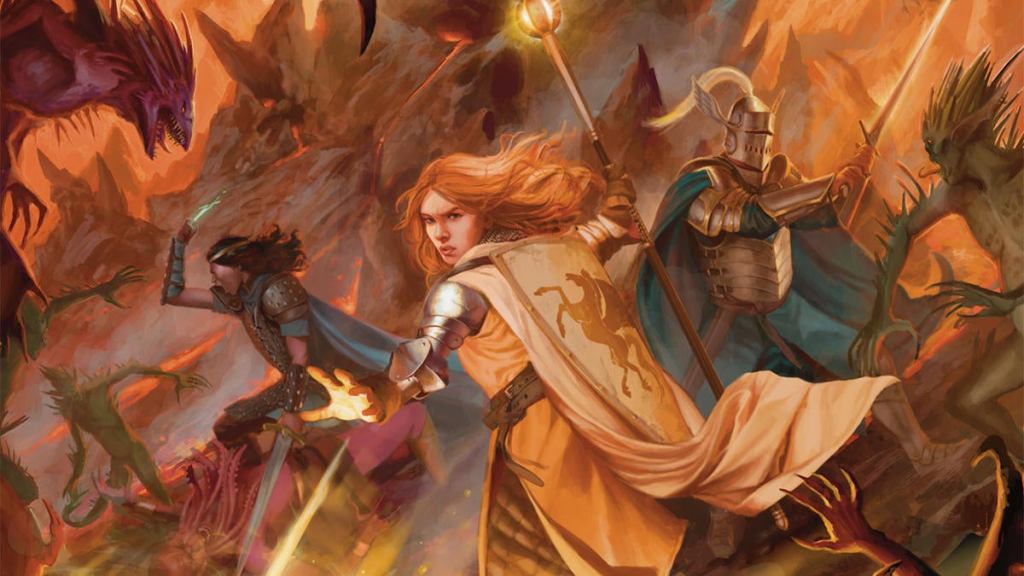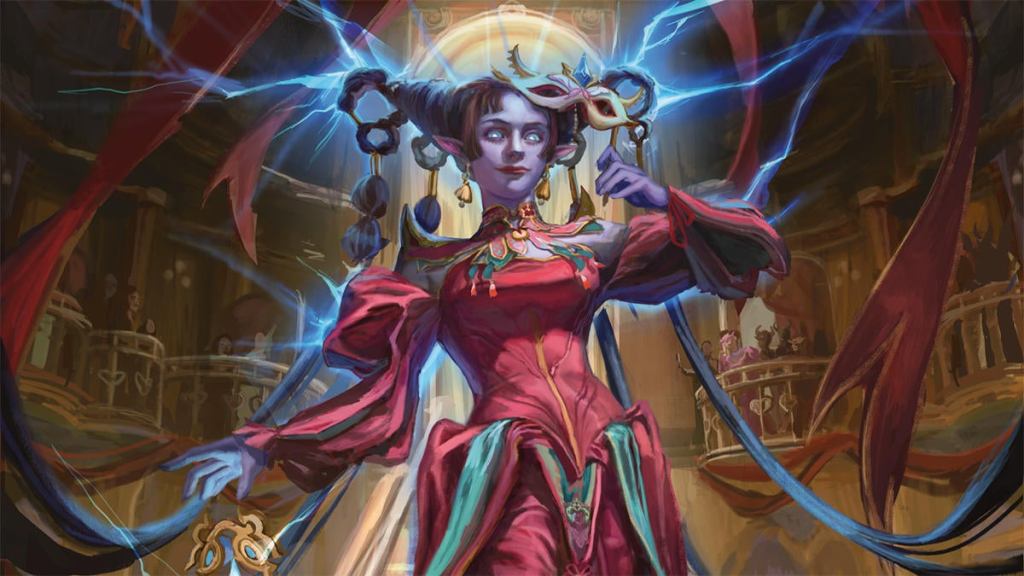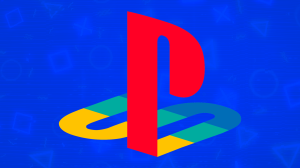A new head of Dungeons & Dragons and new Core Rulebooks provides a fresh start for a venerable tabletop game that seems to constantly find new fans. Last week at Gen Con, Wizards of the Coast celebrated the 50th anniversary of Dungeons & Dragons with a host of events, including the debut of its new Player’s Handbook, a star-studded D&D Live event, and a full slate of programming. While the weekend featured plenty of celebration about the game’s past and present, it also featured a tease of the future in the form of Project Sigil – an in-development VTT app that looks to bring another digital aspect to the game. During Gen Con, ComicBook had the opportunity to speak with Jess Lanzillo, the VP of Franchise and Product for Dungeons & Dragons about what the game could be in the future, along with whether her company will preserve the traditional analog experience as digital gaming becomes a bigger part of Hasbro’s future.
Videos by ComicBook.com
Sitting down with Lanzillo at Gen Con, we first asked about how the new core rulebooks, which are positioned as “rules revisions” for the popular 5th edition of Dungeons & Dragons, sets up the future of the game. “Part of the way that we’re thinking about it is how are these rules now the tools that we can use to be more expansive in the way that we’re thinking about D&D,” Lanzillo said. “And that can be play styles. That can be genres. That can be new worlds. That could be, how do we reimagine worlds that are already established?”
For Lanzillo, the new rules are more about setting the table for the future of Dungeons & Dragons. And another part of that was making a road map for the next five years, looking at what the D&D team could build on the new foundation set by the books by the new rules for the future. “I asked ‘What do we want to do?’” Lanzillo said, before listing some of potential suggestions from her team. “‘Well, we’d like to revisit this place and really give it a new coat of paint. We want to do something totally new over here. We want to figure out how to create new kinds of maybe smaller pieces that can accompany larger releases where we can just be really unique and do something super wild, and so there’s not this huge dependency that it has to be the most successful thing in the world or anything like that.”
A big part of Lanzillo’s approach to Dungeons & Dragons is “freedom,” both from the traditional constraints of a major IP, and also the push to make every product conform to the same design approach or types of voices. “A lot of how we’re really trying to think about it is, ‘how does this give us more freedom’, rather than, ‘how is this giving us more constraints?’” Lanzillo said. “Because I think, especially when you think about not only the rules, but just Dungeons & Dragons as a quote-unquote “franchise,” you can look at a franchise one of two ways. You can go, ‘I want to maniacally over-engineer this thing so that every part is interconnected,” and when I sat down and I looked at it, I said, ‘That’s not what D&D is about at all. D&D is about individual creators coming in with their own voices and lending that to what we’re doing.’”
Most importantly, while Dungeons & Dragons will continue to touch on traditional fantasy tropes, (“We encounter some goblins in the woods. Of course you’re going to have that,” Lanzillo said.) the game will also attempt to grow audience appetite for more unique things. “Fantasy’s the best. Why not just make weird stuff all the time?” Lanzillo said.
One of the biggest questions going into Gen Con was Hasbro’s approach to Dungeons & Dragons, especially in terms of a potential shift to all-digital play. With the acquisition of character builder D&D Beyond and the development of Project Sigil, Hasbro investor calls frequently points to the future of Dungeons & Dragons as digital, even though the game at its heart is a tabletop game. We asked Lanzillo to talk about the recurring fears of digitalization within Dungeons & Dragons and whether there was any mandated shift to digital.
“I think it’s unfortunate that this dichotomy has been set up,” Lanzillo said. “It’s artificial in so many ways. How did most of us play D&D during the lockdown? Was it necessarily everyone’s preferred way of playing it? Hard to say. Some people found that they’ve continued playing digitally. They’re playing on Maps on D&D Beyond and on Discord and on voice calls. Many of us play in person, a more tactile experience. I was probably one of the last migrators to the D&D Beyond character sheet, because I am an artist, so I just draw all of my stuff, and I want to do it in this very bespoke fashion.”
“I’m a big fan of being able to provide play experiences to people any way they want to play them,” Lanzillo continued. “I actually look at it as a form of gatekeeping to be like, “Your version of playing is stupid, and my version of playing is good.” Do I prefer my own version of playing, and do I play in play groups with people who like to play the same way that I do? Yes. And we should all be able to do that, right? But giving players the freedom to create how they want to create, to play how they want to play, is really what it’s all about. And I think sitting here and looking at a future where more and more younger players are playing digitally, they’re jumping into Fortnite or whatever when they’re five, they want to be able to have a path that they understand.” Lanzillo also noted that in her previous experience working on Magic: The Gathering, digital play was actually a gateway to tactile play.
“I just think it’s all part of the same ecosystem, and putting things up against each other and trying to villainize one thing over the other…it’s just about giving people the experiences for wherever they’re at in their life and whoever the people are around them,” Lanzillo said.
In recent investor calls, Hasbro CEO has mentioned the potential of more Dungeons & Dragons crossovers, similar to Magic: The Gathering’s Universes Beyond line. When asked about the possibility of similar crossovers coming to Dungeons & Dragons, Lanzillo stated that she was open to them, but it would have to be a franchise that makes sense and it would have to be additive. “There’s so much rich content that has been created for Dungeons & Dragons over the last 50 years, but in reality, most players are playing with their own IP anyway,” Lanzillo said, referencing the many homebrew worlds of players. “Obviously, people play different kinds of RPGs in different IPs all the time. D&D is currently doing its own thing. We’ve done collaborations in the past with Stranger Things and the Rick and Morty one from a few years back. So, it’s not like we’re strangers to it.”
Still, Lanzillo said that the process for any new crossover needs to be dliberate. “It’s not just slap and dash, like, ‘Oh, let’s just put a fantasy IP on D&D and just sell it,’” Lanzillo said. “That doesn’t give us anything novel or new. But what are new and novel experiences that we aren’t really able to generate on our own? And that could be things that are more globally adjacent, whether that’s things that speak to more anime culture, or things outside of our traditional scope. I think of things like I just did a LARP that was a Downton Abbey-style LARP. So, it’s just, how do we find ways to create new experiences? And maybe there’s a partner there that can help us do that better than we can do on our own.”
Lanzillo also said that she’s open to exploring crossovers that don’t necessarily fit within the traditional mold of D&D. “If you come to me, and you say, “I want to make… I don’t know, Interview with the Vampire,” Lanzillo said. “I don’t know if that works for us as a business, but let’s talk about it. Let’s make sure our rules and our frameworks accommodate that. If that’s the experience you want to have…I don’t want to take it off the table. It goes back to our digital and analog conversation. We’re not Gary Gygax. We don’t get to tell you the right way to do it. The fans and the players are going to tell us what they want to do, and then we’re going to say ‘That sounds cool.’ And we’re going to have some cool, sick ideas, and we’re going to do those, too.”

The mentions of Downton Abbey and Interview With a Vampire led us down a different road, as we asked how Dungeons & Dragons planned to support more roleplay and social encounters in the years ahead. “It goes back to your questioning around Universes Beyond,” Lanzillo said. “It’s not necessarily specifically about finding a blockbuster IP and doing a thing. It’s about what we want to do, and what kind of new areas do we want to go to? What kind of mechanical areas do we have unexplored? I am a big LARPer. I’m a big social role-player. It’s something that I know the struggles around intimately, too. It can be a challenge, and something I really enjoy about D&D is that there are core rules that are more geared towards combat, and they leave a lot of that open. And so, when we look at future-facing products that we want to make, do we want to create products that do fill in some of that gap, that do create some of those social role-play mechanics, and that do have a harder framework to it, but that also make those optional?”
The possibility of modular optional rulesets also keeps the umbrella of D&D open to more kinds of players. “If you’re a person that wants to run some OSR-style, total party kill dungeons, and then all of a sudden, I’m going to make you read 20 pages about courtship or whatever, maybe you’re uncomfortable with that in your game,” Lanzillo said. “That isn’t a thing that necessarily we want to bake into the actual core of what D&D is. But say we did want to make something that was more romantasy-oriented, and we wanted to create that stuff around it. Now, we know that’s not going to be a hundred percent of the D&D audience and it might be a totally new audience in some ways. So, how do we create that bridge back to the core rulebooks but just note that the combat might be pretty light or something.” Lanzillo said that the idea of using Dungeons & Dragons as an adaptive framework was an “exciting challenge” that she looked forward to the team tackling over the next few years.

Our final question for Lanzillo brought us back to the new Core Rulebooks and what she hoped fans would take away from it. “I’ll use filthy Magic terminology first, but when you have a Magic card, and it’s great, and you love it in your deck, and then a new one comes out, and it’s strictly better, you’re going to want to use it,” Lanzillo said. “And I think that’s what we want to see with the Core rulebooks. We want folks to look at the Warlock and think it’s sick and say ‘Of course we’re going to use this Warlock.’ The Blob of Annihilation has a skull of a god inside of it. That’s pretty amazing.”
Lanzillo also hoped that fans understood that the design team had taken 10 years of feedback and implemented them into the new Core Rulebooks to deliver what they feel are the “best outcomes” from that feedback.
She was also excited to see people’s reactions about future releases and what it signals for the future of the game. When we announce whatever all the cool new releases are going to be, I hope everyone loses their mind,” Lanzillo said. “And then, maybe even in that announcement, we say we’re opening up the frameworks in these deliberate ways with some of these releases, and people can see what that’s going to look like. And they can start seeing just how they can not only create adventures and characters within the updated rules, but then also how they can grow their own roleplay experiences and maybe try something new that they haven’t tried before.”
The new Player’s Handbook for Dungeons & Dragons comes out on September 17th.








